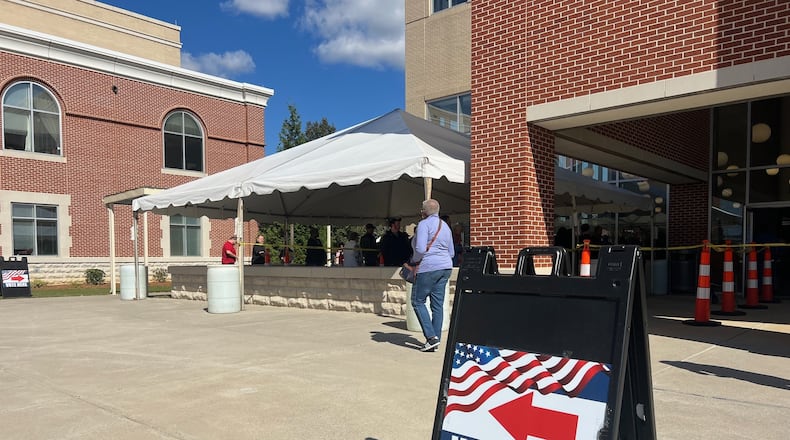Dear voters who are undecided about how to vote or whether to vote at all:
Only days remain for you to decide which candidate, if either, has earned your support in the presidential election. Your choice has largely been framed as a vote for autocracy or democracy; to return to the policies of the past or to chart a course toward a more joyful tomorrow; to “make America great again” or help it inch toward “a more perfect union.”
Credit: Handout
Credit: Handout
It is all these things. However, what if the question is reimagined as: What happens if there is no one left to speak for you? I’m referring to a quote prominently displayed at the U.S. National Holocaust Memorial, blocks from where one of the two presidential candidates will soon sit in the Oval Office. After witnessing the atrocities of Adolf Hitler’s Nazi rule during World War II, German Lutheran pastor Martin Niemöller said:
“First they came for the socialists, and I did not speak out — because I was not a socialist.
Then they came for the trade unionists, and I did not speak out — because I was not a trade unionist.
Then they came for the Jews, and I did not speak out — because I was not a Jew.
Then they came for me — and there was no one left to speak for me.”
In the years since Donald Trump descended the escalator at Trump Tower to announce his presidential ambitions, he has relentlessly “come for” marginalized groups. He came for women and their bodily autonomy. “For 54 years they were trying to get Roe v. Wade terminated, and I did it, and I’m proud to have done it,” he said. He came for the LGBTQ+ community. “The left-wing gender insanity being pushed on our children is an act of child abuse,” he said.
He came for diversity, equity and inclusion initiatives. “I think there is a definite antiwhite feeling in this country, and that can’t be allowed,” he said. He came for accomplished Black women who have dared to hold him accountable, including Fulton County District Attorney Fani Willis. He came for exonerated Black men known as the “Central Park 5.”
He came for our NATO allies, saying he would tell Russia “to do whatever the hell they want” against Ukraine. He came for military prisoners of war, saying, “I like people who weren’t captured.” He came for fallen heroes, referring to them as “losers.”
He came for developing (formerly known as “Third World”) nations, referring to them as “s---hole countries.” He came for undocumented immigrants, saying, “These aren’t people. These are animals.” He came for legal immigrants, saying that they are “poisoning the blood of our country” and have “bad genes.”
He came for the peaceful transition of power, inspiring the deadly riot at the Capitol on Jan. 6, 2021. “We fight like hell. And if you don’t fight like hell, you’re not going to have a country anymore,” he told radical insurrectionists.
He came for American Jews, saying, “Any Jewish person that votes for Democrats hates their religion” and that if he loses, Jews (2% of the U.S. population) would hold “a lot” of the blame.
The list goes on. Even the constituents represented in the Senate by Trump’s running mate, JD Vance, have not been exempt from his racist rhetoric, xenophobic social media messaging or senseless attacks from his most loyal sycophants.
If you’re undecided about whom to support or whether to vote at all, view your choice through the prism of what happens if you remain on the sidelines in this election. Think of the people Trump has already come for. They are the parents of a player on your kid’s team; the barista at your favorite coffee shop; your child’s best friend; your favorite teacher; the person reaching toward the upper shelf at the grocery store; the senior seated in the pew in front of you at church; the friendly neighbor next door.
Maybe it’s the person dining with you at the table as you digest these words — or the person you see when you look in the mirror.
As the cradle of the Civil Rights Movement, Atlanta has long stood for what the Rev. Martin Luther King Jr. called “the creation of a beloved community.” Everyone in Atlanta, the surrounding region and across the country should come together to reject what Trump has done and place their hope in Vice President Kamala Harris’ new generation of leadership. Those of us elsewhere look to you and hope the voices of Georgians will resonate with a clear message in this election.
Whether you were Trump-curious in 2016 or held your nose and voted MAGA in 2020, Trump has likely come closer in 2024 than six degrees of separation between you and the people he has already “come for.” When he undoubtedly comes for you in the future, will there be anyone left to speak on your behalf?
The Rev. Kevin T. Taylor is pastor of Israel A.M.E. Church, a station on the Underground Railroad, in upstate New York.
About the Author
Keep Reading
The Latest
Featured



